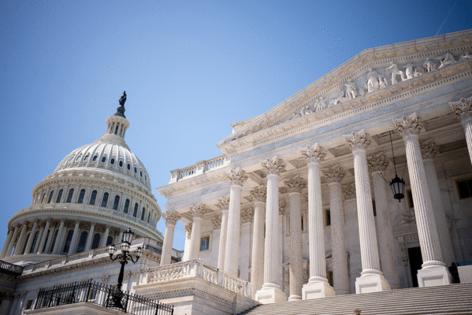Trump tax law to add $3.4 trillion to US deficits, CBO says
Published in News & Features
WASHINGTON — President Donald Trump’s recently enacted tax and spending law will add $3.4 trillion to U.S. deficits over a decade and leave millions without health care coverage, according to a new estimate from the nonpartisan Congressional Budget Office.
The CBO score for the law, released Monday, reflects a $4.5 trillion decrease in revenues and a $1.1 trillion decline in spending through 2034, relative to a current-law baseline. The new analysis doesn’t incorporate so-called dynamic effects, such as the impact on growth or interest rates over time that the legislation’s measures might have.
Trump signed the “One Big Beautiful Bill” into law July 4 after months of negotiations with congressional Republicans. Encompassing much of Trump’s economic agenda, it permanently extends his 2017 income-tax cuts and some breaks for businesses, lifts the cap on federal deductions for state and local taxes and eliminates taxes on tips and overtime on a temporary basis, among other provisions.
Passage of the law triggered warnings from some economists and investors about a widening of America’s budget shortfall — already large by historical standards — that could push borrowing costs and inflation up. The Trump administration points to record collections from the tariffs he’s imposed on most U.S. imports this year, saying that revenue will help fill the gap.
A number of spending cuts were included in the tax law in an effort to reduce deficits and offset the cost, including to Medicaid, which provides health insurance for low-income people.
New work requirements for recipients of Medicaid under the age of 65, are set to begin by the end of 2026. The law also limits states’ ability to tax health care providers to help fund the program. Provisions in the law will result in 10 million Americans losing health insurance by 2034, according to the CBO analysis.
The potential loss of health insurance coverage comes as rising prices due to tariffs already threaten to create increased economic hardship for low-income families. June inflation data showed some signs of the levies’ impact on costs and economists expect prices to continue to rise over the summer. This would disproportionately impact low-income Americans as they tend to spend a larger share of their income on necessities, such as food.
At the request of Senate Republicans, the bill was also scored separately relative to a current policy baseline. On that basis it would reduce deficits by $366 billion over a decade, with revenues falling $849 billion in the period — about one-fifth of the drop recorded in the conventional scoring. Lawmakers used this accounting maneuver to count the permanent extension of the 2017 income-tax cuts as costing nothing.
©2025 Bloomberg L.P. Visit bloomberg.com. Distributed by Tribune Content Agency, LLC.







Comments